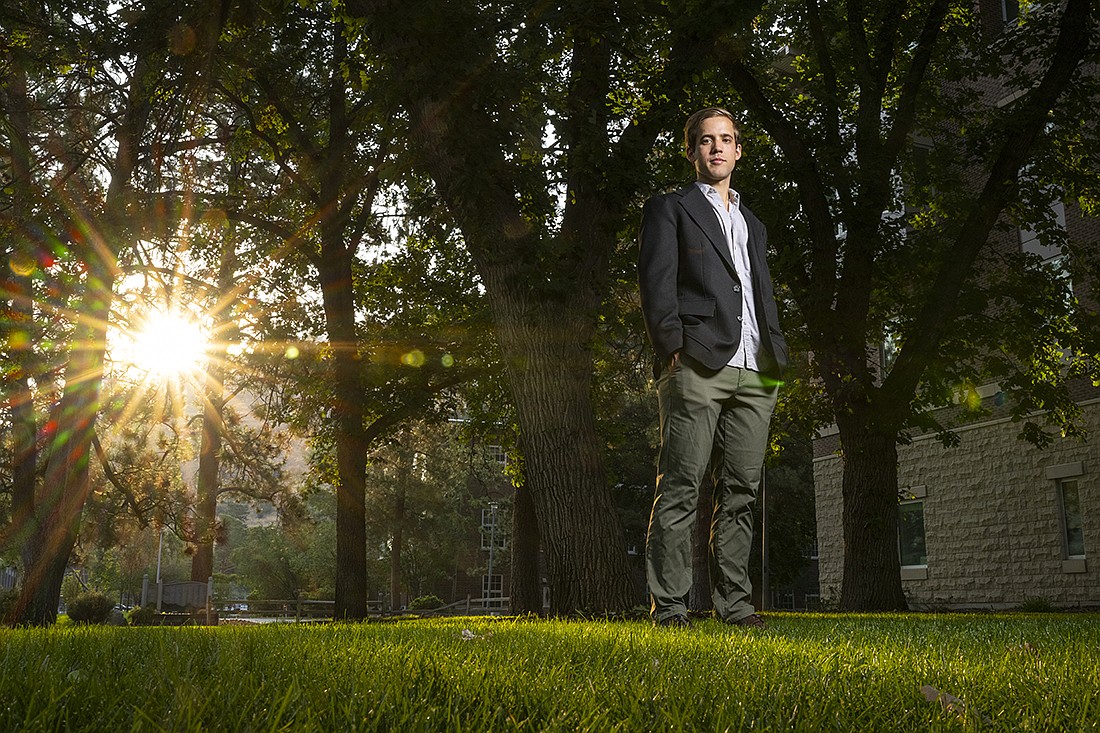UM student studies mental health effects of firefighting
MISSOULA – For seven years, University of Montana student Luke Santore worked on and off as a wildland firefighter, battling blazes in states throughout the West. The work was physically grueling, the frontline conditions dangerous and the social life isolating at best.
But it was the off season he dreaded most.
It was then – the “winters of vice” as he calls it – that Santore went face-to-face with the mental health issues and chemical dependencies that had driven him to drop out of his studies at UM on several occasions and enroll as a firefighter for one of the many private contractors in the field.
He would go on to work for seven years in firefighting, two of those years for the U.S. Forest Service.
“I had mental health and learning disorders that went undiagnosed for a long time, and I came from a family that had access to care,” he said. “What if you don’t have that access? Undiagnosed mental conditions, of course, aren’t that unusual.”
Particularly, he has since come to learn, in a student study he conducted on firefighter mental health.
A native of Manhattan, New York, Santore moved to Missoula in 2013 and enrolled in UM’s forestry program.
“I guess you could say it was one of those ‘go west, young man moments,’” he said. “I like camping, but I really didn’t realize what forestry actually entailed.”
As he bounced in and out of school and on and off the fire line, he sought treatment for his addictions and undiagnosed ADHD. In 2020, he was back in school for good, switching his major to sociology.
“Social justice became my primary motivation in life after experiencing dramatic positive life change thanks to my privileged access to mental health care,” Santore said. “I chose sociology because it seemed like the best educational vehicle to a career focused on social justice issues.”
Santore also reconnected with the Davidson Honors College, which he left after dropping out of UM. He graduated cum laude this past spring.
When it came time to select a subject for his DHC capstone project, Santore decided to dig deeper into his own experiences in firefighting to learn what it was about the profession and all its challenges that drew his attention, and more importantly, was his experience unique?
Daisy Rooks, a professor and chair of the UM Department of Sociology, said sociologists often conduct research that is relevant to their own experience.
“What sets great sociology student projects apart from good ones is when students look beyond their own experience,” she said. “Luke put together a project that pushed beyond his own experience as a firefighter. He looked at the system. That’s a sophisticated move from an undergraduate student.”
For his thesis Santore looked at past studies that found much higher instances of ADHD and suicide among firefighters than in the general population. He also looked at research that showed wildland firefighting likely appeals to those with ADHD because the structure of the job, including a rigid daily structure, strict organizational habits, routine vigorous exercise and a social network of people with shared interests and traits, reflect evidence-based behavioral treatment for people with ADHD.
“I know the structure was beneficial for me,” he said.
Wanting to know more about the social and organizational aspects of the job, Santore then reached out to former coworkers whose phone numbers he had kept and ultimately interviewed 13 about their experience. While he recognizes his was not a representative sample, what he learned mirrored much of his life on the fire line. That included the mental health challenges of transitioning into and out of the fire season, the difficulty in maintaining relationships and social networks at home and the work itself, which involves long days and the physical efforts of a professional athlete. The offseason, many of his interviewees noted, was the most traumatic for them mentally.
Santore said he found it particularly interesting that those he interviewed rarely mentioned the actual dangers of fighting fires as stressful. Most, in fact, loved fighting fires.
“All who left though said it was the best decision of their life for their mental health,” he said.
Based on his interviews, Santore’s study offered potential solutions for making firefighting a more sustainable career. Better pay – most firefighters make $15 to $17 per hour – clearer processes for promotions and access to affordable year-round health care were frequently cited suggestions from those he interviewed. And, perhaps a system for providing work or preferences for hiring of firefighters in the offseason similar to those preferences given to veterans.
“It’s nice to be thanked at a gas station for being a firefighter,” Santore said, “but I wanted health care and better pay.”
Improved working conditions will be needed even more, Santore concluded in his study, to attract and keep firefighters as wildland fires grew more prevalent with global warming.
This month Santore entered graduate school to continue his sociological training and said he’ll likely expand upon his original work studying firefighting and mental health.
Rooks, who will continue as his adviser, said she looks forward to seeing what he does next.
“His undergraduate thesis findings were so interesting,” Rooks explained, “I look forward to what else he can learn about firefighters’ mental health, and the occupation broadly, with more time to work on this and more data to analyze.”
When his master’s is complete, Santore wants to work for nonprofits that help wildland firefights navigate the challenges of the profession.
Santore fought his last fire in 2021 and knows, like those he interviewed, that the job kept him out jail and might have saved his life. But so, too, did leaving it.


